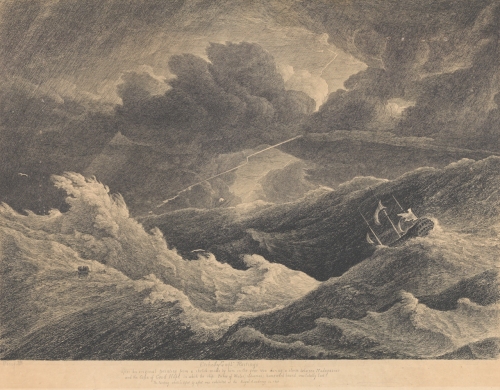On 24 February 1700, Halley reported that the weather was “squally and uncertain” and on the 26th there was a moderate gale until 5.00pm, when:
… the Wind came to SbW fresh with much rain but before night we were forced to go under a foresale only; by Midnight we were forced to Scudd before it; the Storm encreasing till daylight with a Terrible high Sea[.] about Six this Morning a greate Sea broke in upon our Starboard quarter, and withall threw us [so] that we had likt to have oversett; the Deck being full of Water, which had a clear passage over the Gunnell, but it pleased God She wrighted again. So we handed our Foretopsaile and Scudded a hull till this day Noon; The Fury of the Storm Seeming to abate, but the Sea running Mountains high…
I suspect that the situation was rather more dramatic than Halley’s brief report conveys – as dramatic, perhaps, as this account by our old friend the Reverend Henry Teonge, who entertained us at Christmas with two excited descriptions of seasonal feasts. Here, in his characteristic breathless manner, Henry writes of a storm his ship, Assistance, encountered off the coast of Portugal in September 1676:
[16 Sept 1676, extract] Raine, and very stormy; and the seas runn very high. At 6 in the afternoone the storm splitt our fore-sayle all into bitts, and very much rent our new maine-sayle. Wee tooke in that, and bent another maine-sayle, which was no sooner spread, but rent; so that wee were forced to lye under a mizon all that cruell night. The wind grew more stronge, and the seas more furiouse… Now wee ship severall seas; our men are all tyred with pumping and bayling. And wee expect every sea to breake our ship in peices.
[17 Sept 1676, extract] About 4 in the morning the seas groe far more outragious, and breake clearly over our quarter deck; drive our hen-cubbs over-board; and washed on[e] of our seaman cleane off the crotchett-yard. A second sea cam[e], and threw downe all our boomes; brake boath pinnace, and longe boat, on the decks. A third cam[e], and flung our anchor off the ship syd, flung the bell out of place, brake off the carving, and pulld 2 planks a sunder in the midst of the ship… Our forecastle was broake all downe longe before. Now the men are all dishartened, and all expect nothing but the losse of ship and life. Our larboard gunnhill all broake up, a whole planke almost out betweene decks; men swimming about in the wa[i]st of the ship; and greate seas often breaking over us. [1]
Happily, Henry’s “tottered ship” made it back to Deptford, where he was relieved to disembark “the rottenest frigot that ever cam to England”.
Halley’s ship didn’t suffer the damage incurred by the Assistance but his rare use of ‘God’ indicates the extremity of their situation. [2] His literary style may be far more measured than Henry’s, but the scene on the Paramore was perhaps similarly dramatic.
_______________
[1] The Diary of Henry Teonge, Chaplain On Board His Majesty’s Ships Assistance, Bristol, and Royal Oak, Anno 1675 to 1679 (London, 1825).
[2] Halley had a reputation for being irreligious and he only refers to ‘God’ 3 times in his logbooks, all in the second, and all when their lives are imperilled.


